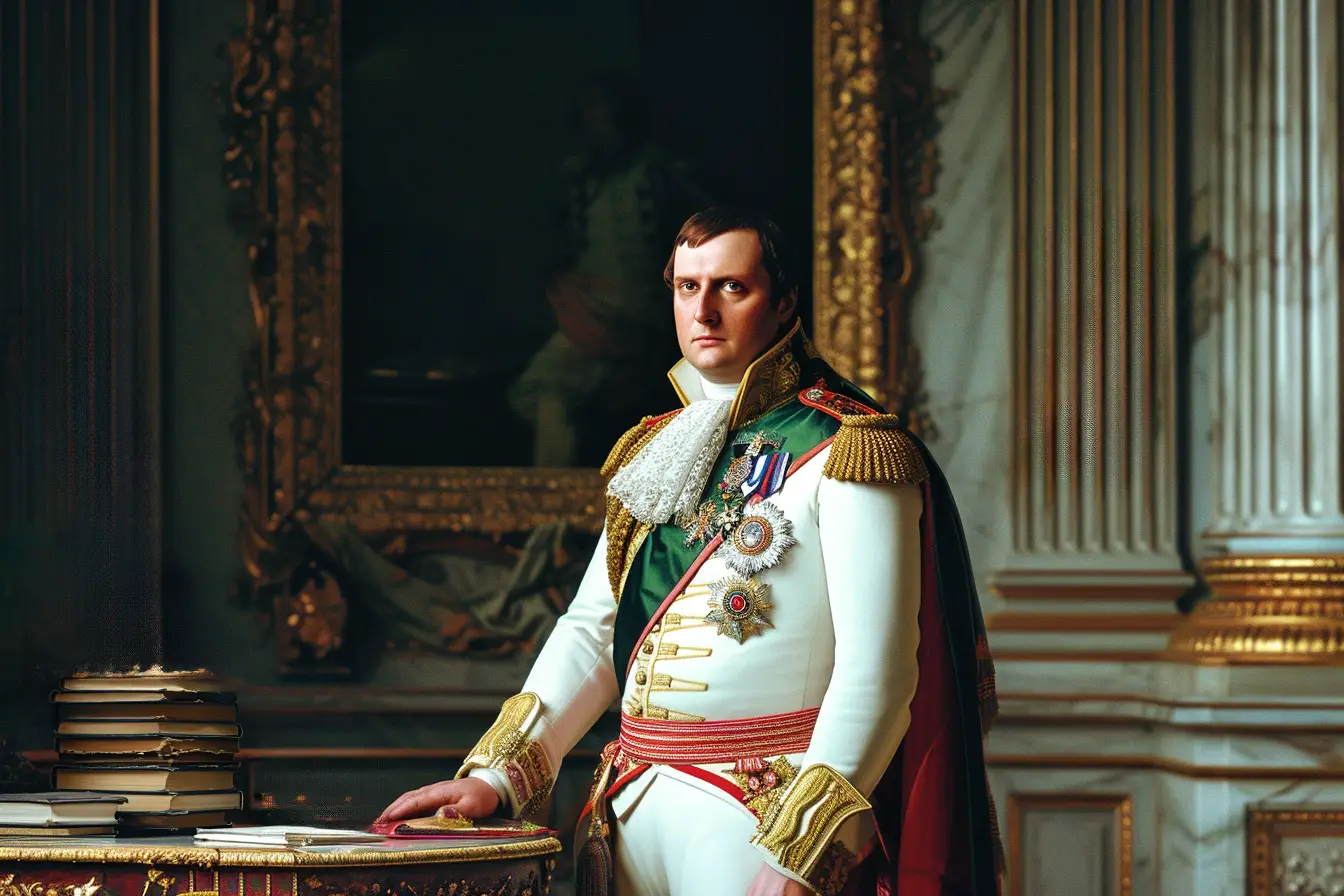Napoleon Bonaparte endures as one of history’s most ambitious and successful military leaders and rulers. His relentless pursuit of power fueled an unparalleled rise from modest origins to conqueror and self-crowned Emperor, overturning Europe’s political order. The intensity enabling his unprecedented triumphs also spawned his eventual downfall and solitary exile where regret took root. Yet there is profound wisdom in Napoleon’s hard-learned perspective for striving young men today regarding the perils of unchecked ambition when emotional bonds, intellectual balance, and ethical responsibility become mere casualties of the battle for glory.
By studying the French Emperor’s reflections on relationships neglected, narrow interests that muted fuller living, the importance of fostering dissenting voices, and most significantly, the many faces bearing the burden of his aggressive campaigns, today’s generation can extract vital lessons on balancing ambition with humanity.
Focus On Building Meaningful Relationships, Not Just Conquests
As a young general and military leader, Napoleon’s central focus was on battlefield conquests, political victories, and expanding the reach of the French Empire across Europe and beyond. He became wholly consumed with strategizing, organizing military campaigns, forging alliances when applicable, and outmaneuvering rivals through ruthless efficiency. In pursuit of power and domination, he viewed people and relationships in largely transactional terms – how could they be leveraged to further his ambitions? Napoleon surrounded himself with loyal generals and advisors but viewed them as chess pieces to direct, not human beings to nurture mutual understanding with.
Only later in life, during lonely days imprisoned on St. Helena island and longing for his second wife and young son, did Napoleon appreciate the profound significance of human relationships. There is a hollowness in conquering the world if you have no trusted friends or loving family to share the journey with. How many friendly debates, relaxed dinners, or lighthearted adventures was Napoleon too hurried or self-important to make time for? Even regarding matters of state, surrounding oneself with thoughtful, trusted counselors who feel invested beyond just a transaction is crucial.
Set Ambitious Goals, But Appreciate Small Daily Progress
Napoleon’s unbridled ambition is an attribute he was well-known for – seeking to have France dominate continental Europe and even Egypt for a time. He set enormously audacious goals and then pursued them relentlessly. But relentlessly dating massive goals can become highly daunting, taxing both physically and mentally, unless adequately paced. Motivation can be flagged when facing setbacks or plateaus as the endpoint remains so distant. Early military failures and the disastrous Russian invasion were turning points showing that singular ambition, absent proper planning and consistent progress, can ruin leaders.
If Napoleon could advise his younger self, he would emphasize appreciating small daily acts of progress amidst an ambitious journey, whether completing an advanced training exercise or efficient bureaucratic reforms. With immense goals, it is easy to dismiss modest gains. However, consistent minor progress demonstrates competence, builds confidence and justifies greater responsibilities. On arduous days, single successes can inspire more than the distant dream. Appreciate each little victory, even as you march toward the capital.
Cultivate Diverse Passions Beyond Your Main Ambition
Napoleon’s greatest strength, yet also a weakness, was his passionate obsession with seeing France as the dominant European power during his lifetime. He sought military dominance and embraced First Consul and Emperor roles to radically reform France’s laws and institutions to facilitate continued supremacy. Indeed, ambition and relentless drive were crucial to the heights of power he reached. But his singular life focus took a toll on his spirit and crushed opportunities for other fulfillment.
In hindsight, maintaining diverse passions and projects apart from the central ambition would have made life richer amidst peaks and valleys. For example, into his 30s, Napoleon abandoned intellectual interests like philosophy and writing to focus on politicking and battlefield strategy. It would have been enlightening to pause political machinations occasionally for quiet contemplation, reflection on ideas, or drafting memoirs on prior eras of life completed! Young leaders should recognize balancing professional goals with personal pursuits that bring joy, counsel wisdom, or aid the community to enrich life’s meaning.
Surround Yourself With People Who Constructively Challenge You
Napoleon’s ascent as a leader evolved from welcoming diverse perspectives on strategy to demanding rigid alignment from his inner circle as First Consul and eventual Emperor. Dissent gradually became perceived as disloyalty, and few dared question his decisions as supreme authority. He became trapped in his echo chamber of propaganda and confirmation bias. In retrospect, eliminating constructive dissent reflected more insecurities than any actual threat.
How much better off would decision-making have been by surrounding himself with reasonable voices who respectfully challenged questionable ideas posed? No leader grasps the faults in their logic alone at first. Had Napoleon regularly debated issues with credible contrarians, he may have avoided late blunders. Beware surrounding solely with yes-men who merely parrot ideas or seem to offer reinforcement. The path to disastrous isolation is paved with sycophants. Leaders must seek truth-tellers to strengthen plans through rigorous scrutiny.
Reflect On The Broader Impacts Of Your Actions
In relentlessly pursuing French imperial expansion through endless warring, Napoleon paid little heed to countless lives and livelihoods disrupted. Consumed with glory, he scarcely considered the private suffering of non-combatants uprooted or forced to quarter troops. Only after years imprisoned alone did he begin to wrestle with ethical repercussions. The ends seldom justify cruel means despite seeming expedient for ambition at the time.
If leaders paused to weigh human impacts, restraint and morality seriously could curb vaunted men from becoming monsters. As a young general, Napoleon’s vision stretched little further than defeating enemy armies to gain leverage to advance. Had he consulted displaced farmers regarding personal costs, at minimum, today’s leaders must avoid such blindness by thoroughly assessing who bears the burdens of grand plans, lest ambition take ethical shortcuts? Whether directing armies or commercial ventures, solemnly reflect on collateral damage faces along the path to victory. Seek alternative routes by which more lives can be uplifted.
Case Study: Chris Endures as an Ambitious Leader Who Learned Hard Lessons
Chris became an ambitious and successful manager who relentlessly pursued promotions, achieving a meteoric rise to VP by overturning the corporate hierarchy. However, the intensity fueling Chris’s unprecedented career triumphs eventually led to downfall and isolation, planting regrets. Yet there are profound lessons in Chris’s journey for aspiring professionals regarding unchecked ambition’s perils when relationships, balance, and ethics become casualty.
Failed to Nurture Relationships, Just Results
As a young manager, Chris fixated on profits and expanding market share ruthlessly. Chris viewed people transactionally – as a means to advance goals. They surrounded themselves with aligned subordinates but did not foster mutual understanding. Only later, left isolated after a scandal, did Chris see that conquering worlds means little without trusted friends or family to share it with.
Valued Only Big Goals, Not Small Wins
Chris was known for audacious multi-year growth targets, aggressively chasing them. But marathons become draining when each mile seems insignificant versus the distant finish line. Early project failures taught that ambition without consistent progress breeds disaster. Instead, Chris advises celebrating small wins for motivation on arduous slogs – whether a billing record or project milestone.
Discouraged Dissent, Then Faced Disgrace
Initially open to debate, Chris evolved to surround themselves solely with aligned voices reinforcing decisions as VP. This echo chamber bred isolation and skewed objectivity. The lack of dissenting guidance became apparent only after a significant public scandal. Leaders require truth-tellers who strengthen plans through rigor, not just reinforcement.
Failed to Reflect on Broader Impacts
In Chris’s relentless pace, they rarely considered who bore the burdens of their leadership approach beyond the corporate walls. Only after watching colleagues cover at trial did Chris wrestle with the ethical repercussions of their ambition. Aspiring leaders must avoid Chris’s early blindness by wholly assessing their strategies’ full brunt, lest ambition take ethical shortcuts.
Chris’s story warns that ambition absent humanity and wisdom can become poisonous. Achievement should never eclipse ethical responsibility and care for others affected. By examining why even historic success left Chris regimented and unfulfilled, emerging professionals can balance lofty aspirations with grounded values – charting a course to lasting greatness through moral means. True leaders uplift more than themselves alone.
Key Takeaways
- Cherish interpersonal bonds – they provide meaning distinct from professional victories.
- Acknowledge incremental progress – it galvanizes persistence en route to audacious goals.
- Nurture diverse pursuits – they sustain the spirit during ups and downs
- Welcome good-faith dissent – it refines strategies and averts insularity
- Analyze full human impacts – assess ethical means, not solely ambitious ends
Conclusion
Napoleon Bonaparte’s unrivaled ambition was the double-edged sword fueling his meteoric ascent and ultimate isolation. While relentless drive and bold vision are valuable traits for achieving historical change, Napoleon’s life also charts crucial lessons for aspiring men regarding the detriments of unchecked ambition. Amid the quest for eminence, one must not forfeit meaningful relationships, rewards found in modest daily progress, or intellectual passions apart from status-seeking.












Leave a Reply